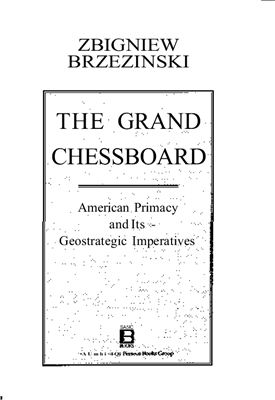Basic Books 1998. 223 pages.
As the twentieth century draws to a close, the United States has emerged as the world’s only superpower: no other nation possesses comparable military and economic power or has interests that bestride the globe. Yet the critical question facing America remains unanswered: What should be the nation’s global strategy for maintaining its exceptional position in the world? Zbigniew Brzezinski tackles this question head-on in this incisive and pathbreaking book.The Grand Chessboard presents Brzezinski’s bold and provocative geostrategic vision for American preeminence in the twenty-first century. Central to his analysis is the exercise of power on the Eurasian landmass, which is home to the greatest part of the globe’s population, natural resources, and economic activity. Stretching from Portugal to the Bering Strait, from Lapland to Malaysia, Eurasia is the grand chessboard on which America’s supremacy will be ratified and challenged in the years to come. The task facing the United States, he argues, is to manage the conflicts and relationships in Europe, Asia, and the Middle East so that no rival superpower arises to threaten our interests or our well-being.
As the twentieth century draws to a close, the United States has emerged as the world’s only superpower: no other nation possesses comparable military and economic power or has interests that bestride the globe. Yet the critical question facing America remains unanswered: What should be the nation’s global strategy for maintaining its exceptional position in the world? Zbigniew Brzezinski tackles this question head-on in this incisive and pathbreaking book.The Grand Chessboard presents Brzezinski’s bold and provocative geostrategic vision for American preeminence in the twenty-first century. Central to his analysis is the exercise of power on the Eurasian landmass, which is home to the greatest part of the globe’s population, natural resources, and economic activity. Stretching from Portugal to the Bering Strait, from Lapland to Malaysia, Eurasia is the grand chessboard on which America’s supremacy will be ratified and challenged in the years to come. The task facing the United States, he argues, is to manage the conflicts and relationships in Europe, Asia, and the Middle East so that no rival superpower arises to threaten our interests or our well-being.

